Topic 11 礼仪民族二轮专题学案(含答案解析)-2025年初中英语中考传统文化阅读与写作专练(第二期)
文档属性
| 名称 | Topic 11 礼仪民族二轮专题学案(含答案解析)-2025年初中英语中考传统文化阅读与写作专练(第二期) |
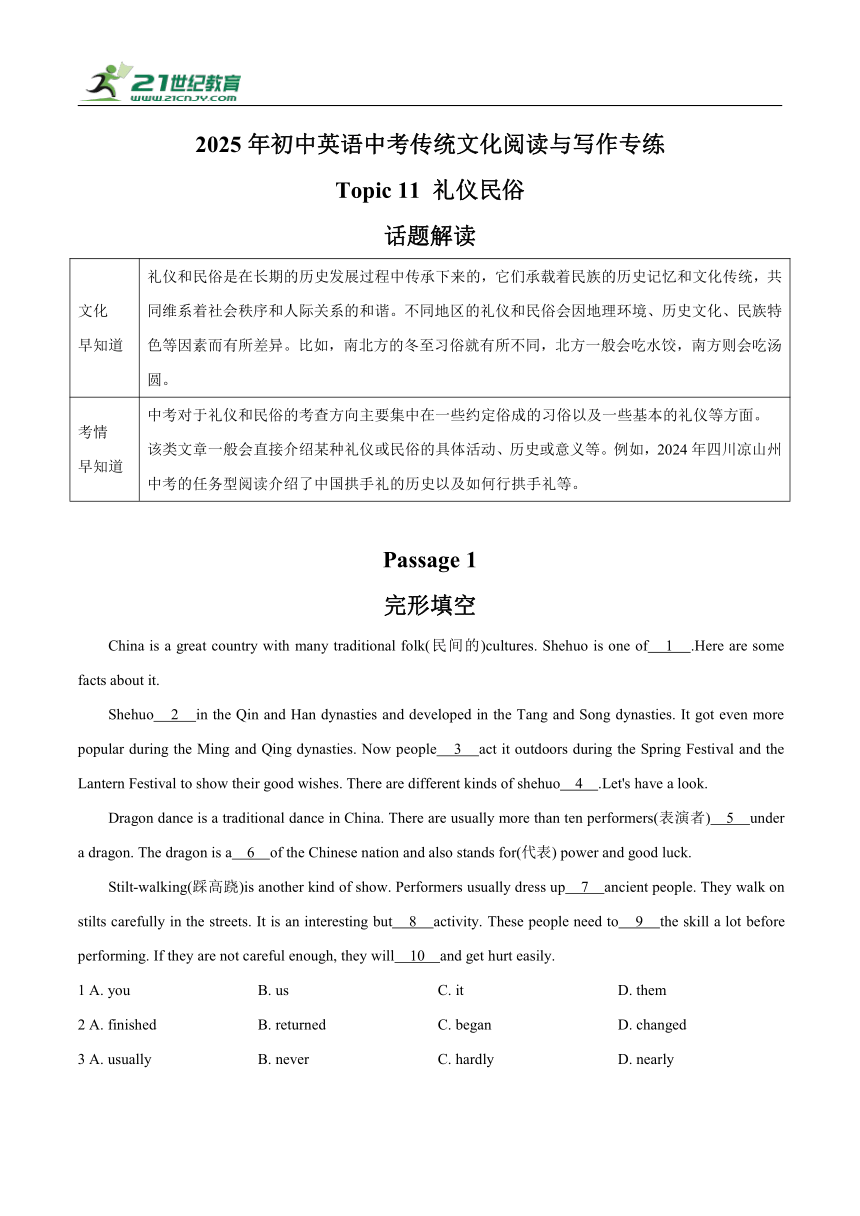
|
|
| 格式 | docx | ||
| 文件大小 | 75.9KB | ||
| 资源类型 | 试卷 | ||
| 版本资源 | 人教新目标(Go for it)版 | ||
| 科目 | 英语 | ||
| 更新时间 | 2025-04-13 20:50:32 | ||
图片预览

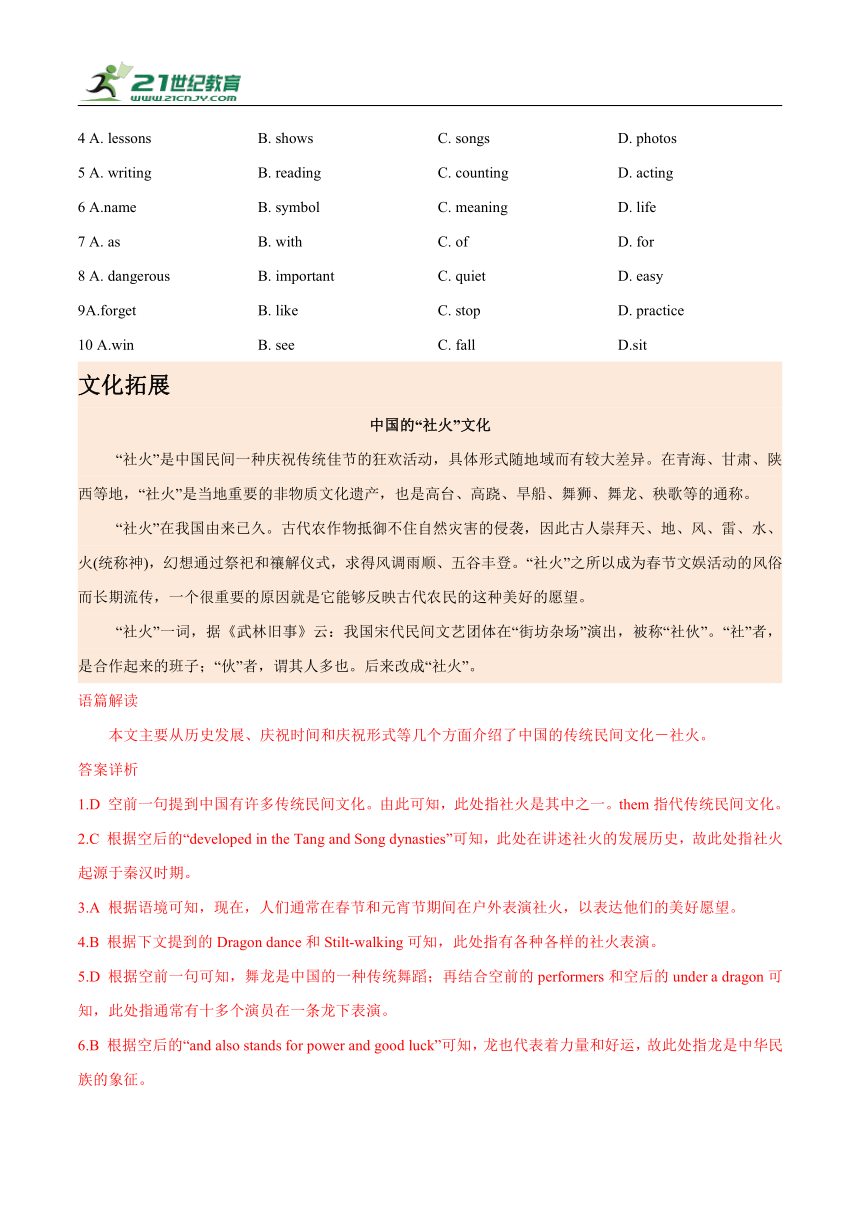
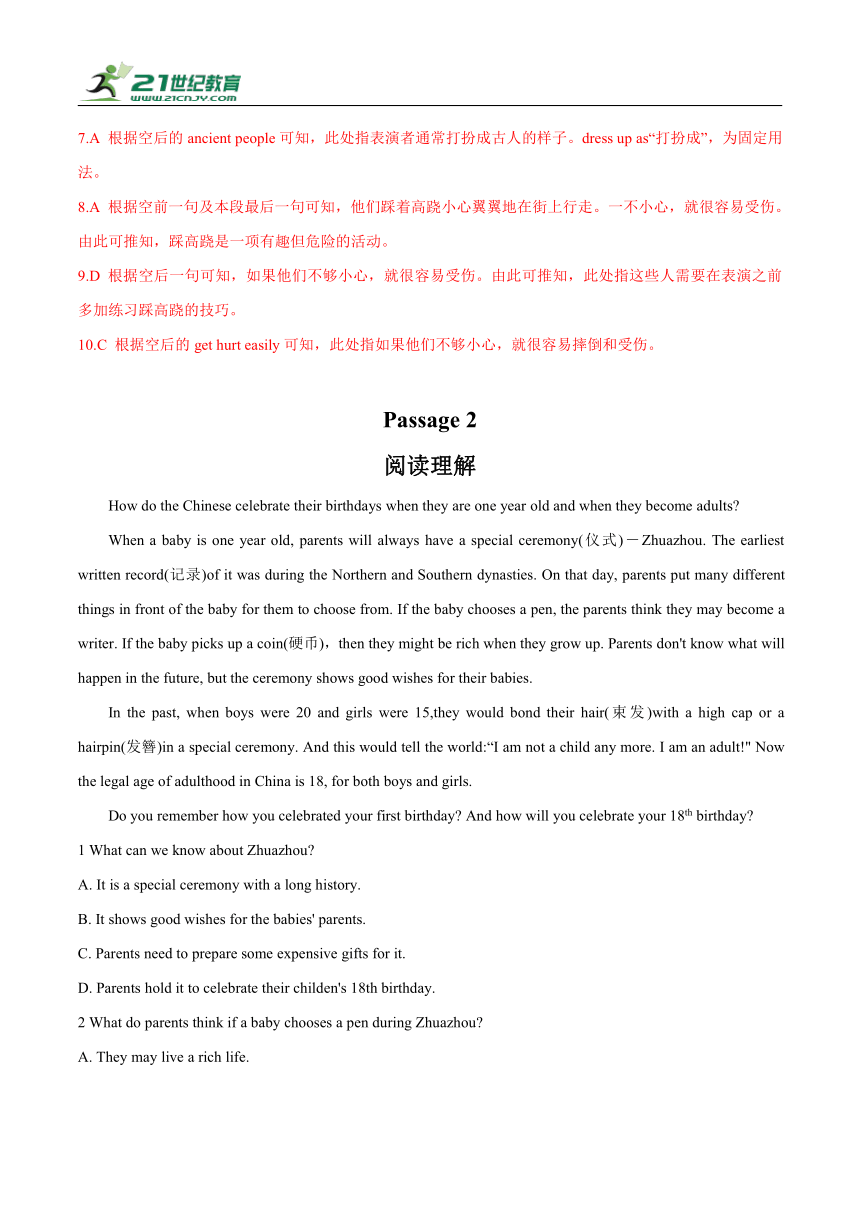
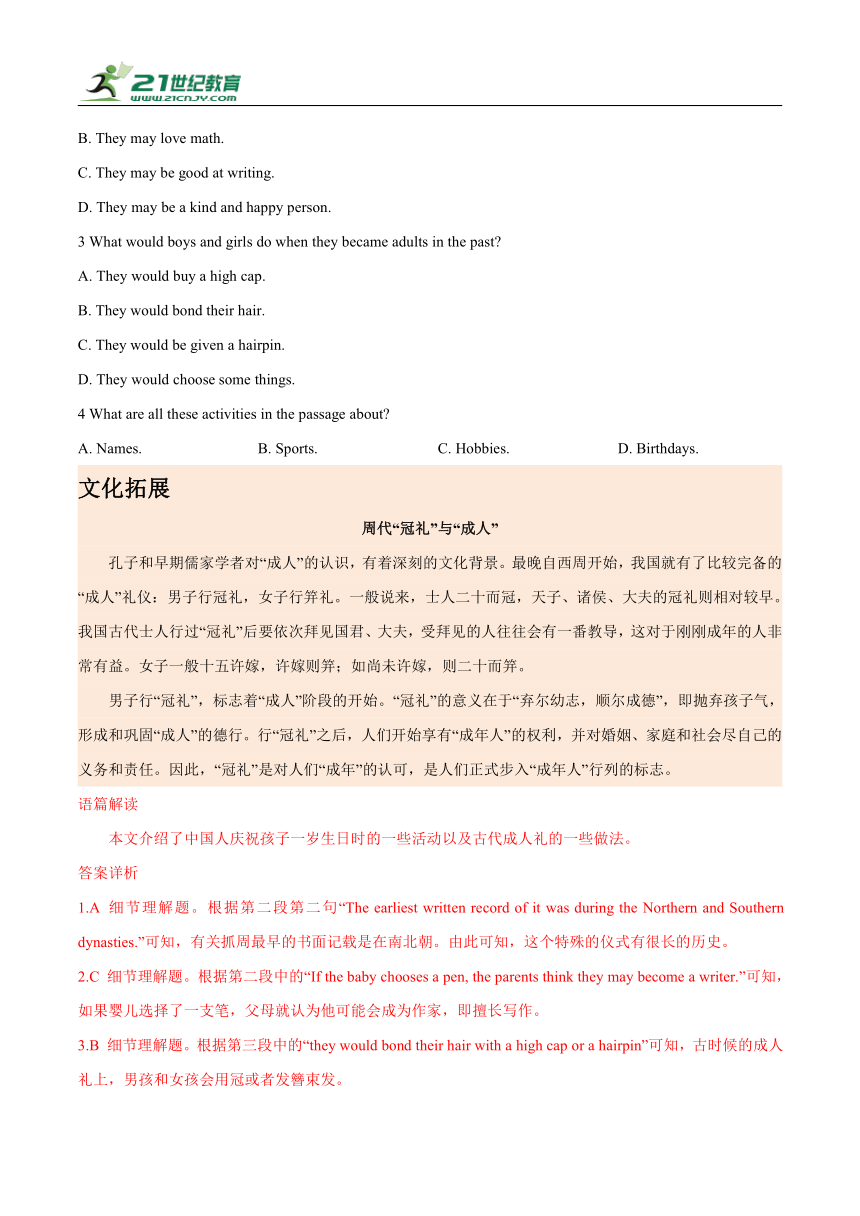
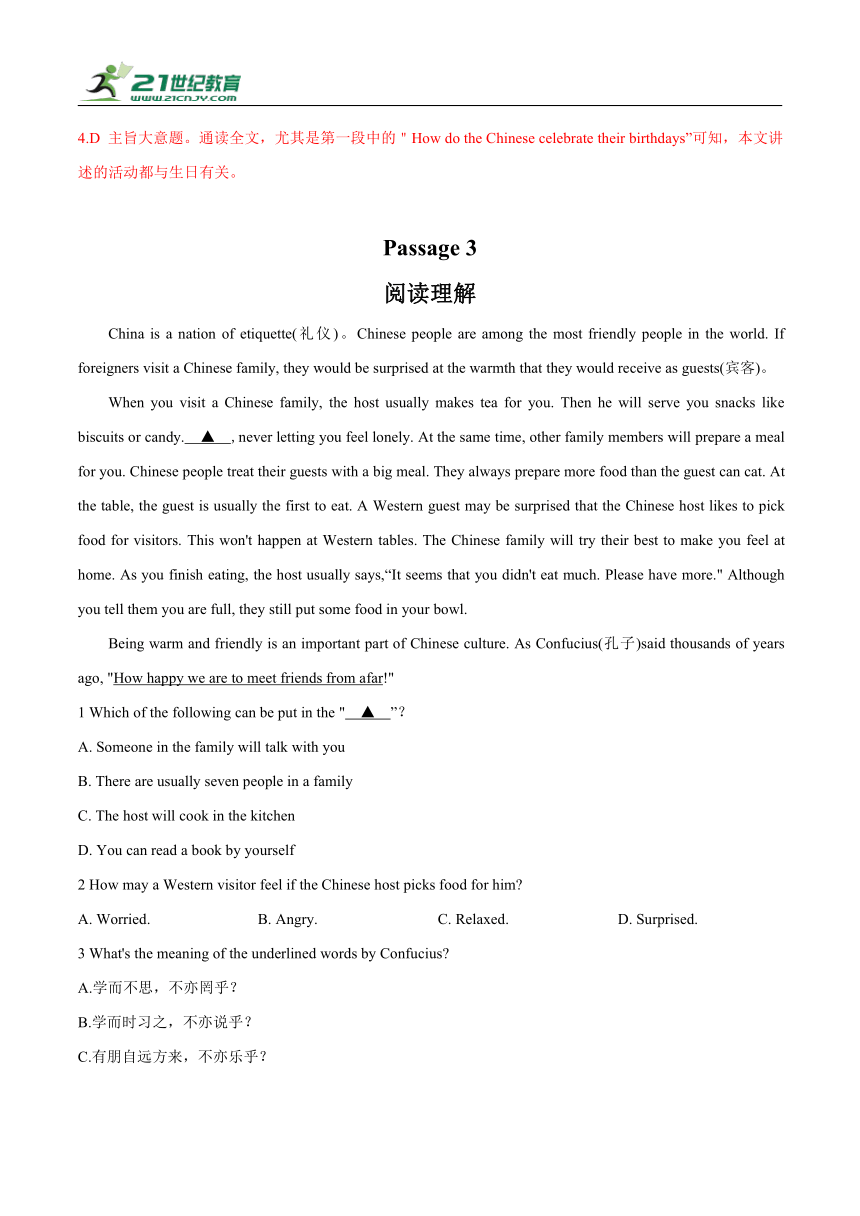
文档简介
2025年初中英语中考传统文化阅读与写作专练
Topic 11 礼仪民俗
话题解读
文化 早知道 礼仪和民俗是在长期的历史发展过程中传承下来的,它们承载着民族的历史记忆和文化传统,共同维系着社会秩序和人际关系的和谐。不同地区的礼仪和民俗会因地理环境、历史文化、民族特色等因素而有所差异。比如,南北方的冬至习俗就有所不同,北方一般会吃水饺,南方则会吃汤圆。
考情 早知道 中考对于礼仪和民俗的考查方向主要集中在一些约定俗成的习俗以及一些基本的礼仪等方面。 该类文章一般会直接介绍某种礼仪或民俗的具体活动、历史或意义等。例如,2024年四川凉山州中考的任务型阅读介绍了中国拱手礼的历史以及如何行拱手礼等。
Passage 1
完形填空
China is a great country with many traditional folk(民间的)cultures. Shehuo is one of 1 .Here are some facts about it.
Shehuo 2 in the Qin and Han dynasties and developed in the Tang and Song dynasties. It got even more popular during the Ming and Qing dynasties. Now people 3 act it outdoors during the Spring Festival and the Lantern Festival to show their good wishes. There are different kinds of shehuo 4 .Let's have a look.
Dragon dance is a traditional dance in China. There are usually more than ten performers(表演者) 5 under a dragon. The dragon is a 6 of the Chinese nation and also stands for(代表) power and good luck.
Stilt-walking(踩高跷)is another kind of show. Performers usually dress up 7 ancient people. They walk on stilts carefully in the streets. It is an interesting but 8 activity. These people need to 9 the skill a lot before performing. If they are not careful enough, they will 10 and get hurt easily.
1 A. you B. us C. it D. them
2 A. finished B. returned C. began D. changed
3 A. usually B. never C. hardly D. nearly
4 A. lessons B. shows C. songs D. photos
5 A. writing B. reading C. counting D. acting
6 A.name B. symbol C. meaning D. life
7 A. as B. with C. of D. for
8 A. dangerous B. important C. quiet D. easy
9A.forget B. like C. stop D. practice
10 A.win B. see C. fall D.sit
文化拓展
中国的“社火”文化
“社火”是中国民间一种庆祝传统佳节的狂欢活动,具体形式随地域而有较大差异。在青海、甘肃、陕西等地,“社火”是当地重要的非物质文化遗产,也是高台、高跷、旱船、舞狮、舞龙、秧歌等的通称。
“社火”在我国由来已久。古代农作物抵御不住自然灾害的侵袭,因此古人崇拜天、地、风、雷、水、火(统称神),幻想通过祭祀和禳解仪式,求得风调雨顺、五谷丰登。“社火”之所以成为春节文娱活动的风俗而长期流传,一个很重要的原因就是它能够反映古代农民的这种美好的愿望。
“社火”一词,据《武林旧事》云:我国宋代民间文艺团体在“街坊杂场”演出,被称“社伙”。“社”者,是合作起来的班子;“伙”者,谓其人多也。后来改成“社火”。
语篇解读
本文主要从历史发展、庆祝时间和庆祝形式等几个方面介绍了中国的传统民间文化-社火。
答案详析
1.D 空前一句提到中国有许多传统民间文化。由此可知,此处指社火是其中之一。them指代传统民间文化。
2.C 根据空后的“developed in the Tang and Song dynasties”可知,此处在讲述社火的发展历史,故此处指社火起源于秦汉时期。
3.A 根据语境可知,现在,人们通常在春节和元宵节期间在户外表演社火,以表达他们的美好愿望。
4.B 根据下文提到的Dragon dance和Stilt-walking可知,此处指有各种各样的社火表演。
5.D 根据空前一句可知,舞龙是中国的一种传统舞蹈;再结合空前的performers和空后的under a dragon可知,此处指通常有十多个演员在一条龙下表演。
6.B 根据空后的“and also stands for power and good luck”可知,龙也代表着力量和好运,故此处指龙是中华民族的象征。
7.A 根据空后的ancient people可知,此处指表演者通常打扮成古人的样子。dress up as“打扮成”,为固定用法。
8.A 根据空前一句及本段最后一句可知,他们踩着高跷小心翼翼地在街上行走。一不小心,就很容易受伤。由此可推知,踩高跷是一项有趣但危险的活动。
9.D 根据空后一句可知,如果他们不够小心,就很容易受伤。由此可推知,此处指这些人需要在表演之前多加练习踩高跷的技巧。
10.C 根据空后的get hurt easily可知,此处指如果他们不够小心,就很容易摔倒和受伤。
Passage 2
阅读理解
How do the Chinese celebrate their birthdays when they are one year old and when they become adults
When a baby is one year old, parents will always have a special ceremony(仪式)-Zhuazhou. The earliest written record(记录)of it was during the Northern and Southern dynasties. On that day, parents put many different things in front of the baby for them to choose from. If the baby chooses a pen, the parents think they may become a writer. If the baby picks up a coin(硬币),then they might be rich when they grow up. Parents don't know what will happen in the future, but the ceremony shows good wishes for their babies.
In the past, when boys were 20 and girls were 15,they would bond their hair(束发)with a high cap or a hairpin(发簪)in a special ceremony. And this would tell the world:“I am not a child any more. I am an adult!" Now the legal age of adulthood in China is 18, for both boys and girls.
Do you remember how you celebrated your first birthday And how will you celebrate your 18th birthday
1 What can we know about Zhuazhou
A. It is a special ceremony with a long history.
B. It shows good wishes for the babies' parents.
C. Parents need to prepare some expensive gifts for it.
D. Parents hold it to celebrate their childen's 18th birthday.
2 What do parents think if a baby chooses a pen during Zhuazhou
A. They may live a rich life.
B. They may love math.
C. They may be good at writing.
D. They may be a kind and happy person.
3 What would boys and girls do when they became adults in the past
A. They would buy a high cap.
B. They would bond their hair.
C. They would be given a hairpin.
D. They would choose some things.
4 What are all these activities in the passage about
A. Names. B. Sports. C. Hobbies. D. Birthdays.
文化拓展
周代“冠礼”与“成人”
孔子和早期儒家学者对“成人”的认识,有着深刻的文化背景。最晚自西周开始,我国就有了比较完备的“成人”礼仪:男子行冠礼,女子行笄礼。一般说来,士人二十而冠,天子、诸侯、大夫的冠礼则相对较早。我国古代士人行过“冠礼”后要依次拜见国君、大夫,受拜见的人往往会有一番教导,这对于刚刚成年的人非常有益。女子一般十五许嫁,许嫁则笄;如尚未许嫁,则二十而笄。
男子行“冠礼”,标志着“成人”阶段的开始。“冠礼”的意义在于“弃尔幼志,顺尔成德”,即抛弃孩子气,形成和巩固“成人”的德行。行“冠礼”之后,人们开始享有“成年人”的权利,并对婚姻、家庭和社会尽自己的义务和责任。因此,“冠礼”是对人们“成年”的认可,是人们正式步入“成年人”行列的标志。
语篇解读
本文介绍了中国人庆祝孩子一岁生日时的一些活动以及古代成人礼的一些做法。
答案详析
1.A 细节理解题。根据第二段第二句“The earliest written record of it was during the Northern and Southern dynasties.”可知,有关抓周最早的书面记载是在南北朝。由此可知,这个特殊的仪式有很长的历史。
2.C 细节理解题。根据第二段中的“If the baby chooses a pen, the parents think they may become a writer.”可知,如果婴儿选择了一支笔,父母就认为他可能会成为作家,即擅长写作。
3.B 细节理解题。根据第三段中的“they would bond their hair with a high cap or a hairpin”可知,古时候的成人礼上,男孩和女孩会用冠或者发簪束发。
4.D 主旨大意题。通读全文,尤其是第一段中的"How do the Chinese celebrate their birthdays”可知,本文讲述的活动都与生日有关。
Passage 3
阅读理解
China is a nation of etiquette(礼仪)。Chinese people are among the most friendly people in the world. If foreigners visit a Chinese family, they would be surprised at the warmth that they would receive as guests(宾客)。
When you visit a Chinese family, the host usually makes tea for you. Then he will serve you snacks like biscuits or candy. ▲ ,never letting you feel lonely. At the same time, other family members will prepare a meal for you. Chinese people treat their guests with a big meal. They always prepare more food than the guest can cat. At the table, the guest is usually the first to eat. A Western guest may be surprised that the Chinese host likes to pick food for visitors. This won't happen at Western tables. The Chinese family will try their best to make you feel at home. As you finish eating, the host usually says,“It seems that you didn't eat much. Please have more." Although you tell them you are full, they still put some food in your bowl.
Being warm and friendly is an important part of Chinese culture. As Confucius(孔子)said thousands of years ago, "How happy we are to meet friends from afar!"
1 Which of the following can be put in the " ▲ ”?
A. Someone in the family will talk with you
B. There are usually seven people in a family
C. The host will cook in the kitchen
D. You can read a book by yourself
2 How may a Western visitor feel if the Chinese host picks food for him
A. Worried. B. Angry. C. Relaxed. D. Surprised.
3 What's the meaning of the underlined words by Confucius
A.学而不思,不亦罔乎?
B.学而时习之,不亦说乎?
C.有朋自远方来,不亦乐乎?
D.人不知而不愠,不亦君子乎?
4 What's the best title for the passage
A. Cultural differences
B. Chinese eating habits
C. Traditional Chinese families
D. Chinese ways of treating guests
文化拓展
茶桌上的礼仪之道
“淡酒邀明月,香茶迎故人。”茶是古人喜爱的饮品,也是现代人待客的必备佳品,而敬茶,也是有讲究的。
为客人沏茶之前,要先洗净双手,并洗净茶杯或茶碗。要特别注意茶杯、茶碗有无破损或裂纹,破的茶杯、茶碗是不能用来待客的,还要注意其他茶具有无茶锈,一定要清洗干净。取茶叶时,要用茶具拿捏,不要用手直接抓,这是对客人的尊敬。沏茶前,要征求客人意见,以客人口味选择茶的品种,选好茶叶的品种后,我们需要给客人沏茶。
给客人沏茶的顺序也不能大意。《常礼举要》上说,敬茶先长后幼,先生客后熟客。另外,一定要让客人坐在上座,主人坐在下座,举杯让茶,请客人先喝,这是对客人的尊重。切记不可乱坐位置,或者自己先喝。“长茶七、敬酒十”,就是说敬茶茶杯七分满、敬酒酒杯十分满,这是因为茶水是烫的,如果太满了就容易烫着客人,这是对客人的不敬。
语篇解读
中国被称为礼仪之邦。本文主要介绍了中国的待客之道。
答案详析
1.A 句子还原题。根据空前内容可知,主人会为客人泡茶,并端来饼干或糖果之类的零食。根据空后的“never letting you feel lonely”可知,空处内容应与主人为客人做的事情有关,且做的事情要让客人感觉不到孤单,故A项“这个家里的某个人会和你聊天”可承上启下,符合语境。
2.D 细节理解题。根据第二段中的“A Western guest may be surprised...This won't happen at Western tables.”可知,西方客人可能会对中国主人喜欢为客人夹菜这件事感到惊讶。在西方餐桌上,这种情况是不会发生的。
3.C 句意理解题。根据最后一段第一句可知,热情友好是中国文化的重要组成部分。再结合语境可知,孔子这句话可被译为“有朋自远方来,不亦乐乎?”。
4.D 标题归纳题。通读全文可知,本文主要介绍了中国人招待客人的一些礼仪,故D项“中国的待客之道”可为本文最佳标题。
Passage 4
阅读理解
There is a saying in Xunpu, Fujian, "Put flowers in your hair in this life, and you'll also be beautiful in the afterlife."The women there have long hair and wear colorful and special flower headdresses(头饰)called zanhua or zanhuawei. In 2008,zanhua became a national intangible cultural heritage(非物质文化遗产)。
Huang Rongbing is a salon(美发店)keeper. When he was a child he used to watch his mother make a bun(圆髻)at the back of her head and put colorful flowers into her hair. Now, people can try zanhua at his salon. More and more people visit Xunpu to try this headdress. And it makes Huang happy because it keeps his salon busy and helps share the history and culture behind the zanhua head- dress.
Huang made zanhua for many people. A girl even spread it to France and Australia in 2023. She was dressed i traditional Chinese clothes with beautiful flowers in her hair. Under the Eiffel Tower, she took photos and videos of herself.
Today, Xunpu is becoming a hot place to visit for people around the world. More and more young people like to visit this place not only for fun but also for its culture. They want to try and see zanhua by themselves. They believe zanhua can bring them good luck, too.
1 How does the writer start this passage
A. By asking a question. B. By telling a joke.
C. By using a saying. D. By making a survey.
2 What makes Huang Rongbing's salon busy according to Paragraph 2
A. His mother is popular online.
B. It is the cheapest in the village.
C. There is only one salon in Xunpu.
D. More people visit Xunpu to try zanhua.
3 What does the underlined word “spread” mean in Chinese
A.传播 B.发明 C.隐藏 D.阻止
4 Which of the following is NOT true according to the passage
A. Some people think zanhua is a symbol of good luck.
B. More and more young people become interested in zanhua.
C. Huang Rongbing is glad to share the culture behind zanhua.
D. Zanhua became a national intangible cultural heritage in 2018.
5 What is the passage mainly about
A. The history of Xunpu, Fujian
B.A traditional headdress
C. A famous salon
D. The culture behind traditional Chinese clothes
文化拓展
泉州簪花:花中仙子,千年传承
在华夏五千年的灿烂文化中,泉州簪花犹如一颗璀璨的明珠,熠熠生辉。作为中国传统手工艺的瑰宝,泉州簪花拥有着悠久的历史渊源和深厚的文化底蕴。自古以来,泉州簪花便以其精美的工艺、独特的风格和寓意深远的文化内涵,赢得了“花中仙子”的美誉。
关于簪花最早的记载是汉高祖时期,陆贾所著的《南越行纪》提到:“彼之女子,以彩丝穿花心,以为首饰。”在中国传统文化中,发饰一直是女性美丽的象征,而泉州簪花作为发饰的一种,更是承载着许多美好的寓意和祝福。它代表着吉祥、幸福和美满,寄托了人们对美好生活的向往和追求。在古代,泉州簪花常被作为婚嫁礼品赠送给新娘,寓意着祝福新人白头偕老、永结同心。
语篇解读
簪花是福建蟳埔村的风俗,2008年被列入国家级非物质文化遗产名录。本文介绍了簪花这项习俗,以及黄榕冰与簪花之间的故事。
答案详析
1.C 推理判断题。作者在文章开头引用了一句谚语“今生簪花,来世漂亮”,从而引出了簪花这项习俗。由此可推知,作者是通过使用一句谚语来开篇的。
2.D 细节理解题。根据第二段中的“More and more people visit Xunpu to try this headdress.”和“it keeps his salon busy”可知,越来越多的人到蟳埔村来尝试这种头饰,这使得黄榕冰的美发店忙碌了起来。
3.A 词义猜测题。根据画线词前的内容可知,黄榕冰为许多人做过簪花。根据画线词后两句可知,一个女孩身着中国传统服装,头戴簪花,在埃菲尔铁塔下拍摄了自己的照片和视频。由此可推知,此处指一个女孩甚至把簪花传播到了法国和澳大利亚,故推测spread意为“传播”。
4.D 细节理解题。根据第一段最后一句“In 2008, zanhua became a national intangible cultural heritage.”可知,2008年,簪花成为国家级非物质文化遗产。
5.B 主旨大意题。通读全文可知,本文主要讲述了福建蟳埔村的习俗-簪花,故B项符合题意。
Passage 5
任务型阅读
Hongbao, or the red packet, is a red envelope with gift money inside. Giving hongbao is a tradition in China, and it has a long history. Kids can usually receive(收到)red packets from their parents, grandparents and other relatives during the Spring Festival and their birthdays. People think red packets can bring good luck.
These years, the tradition is going high-tech(高科技的)。The red packet has turned into e-hongbao on the mobile phone. During important festivals, people send e-hongbao to their family members and friends by WeChat, QQ and so on.
E-hongbao makes people closer to each other. You can send e-hongbao to others no matter how far away they are. People won't care how much money you give them. They will feel warm because you still remember and care about them. E-hongbao also brings fun to people. People can send it anywhere at any time. People who get e-hongbao will feel surprised.
However, e-hongbao may also be bad. People may spend too much of their free time grabbing (抢)e-hongbao and care less about their life and people around them.
根据短文内容,回答下列问题。
1 When do kids usually receive red packets
____________________________________________________________________________________________
2 What do people think of red packets
____________________________________________________________________________________________
3 How do people send e-hongbao to others
____________________________________________________________________________________________
4 How will people feel when they receive e-hongbao
____________________________________________________________________________________________
5 What bad influence may e-hongbao have on people
____________________________________________________________________________________________
文化拓展
中国的红包文化
中国红包有着悠久的历史,可以追溯到几个世纪前。这些充满活力的红包通常饰有复杂的图案和金色装饰,在中国文化中具有重要意义,通常在特殊场合和庆祝活动中使用。红色被认为象征着好运、幸福和辟邪。人们相信,通过将钱放入红包中,可以给收礼者带来祝福和好运。
送红包的习俗源于中国古代民间传说。相传有一种可怕的神兽,名叫“年”,每到除夕夜,它就会出来伤害村民,吃掉他们的牲畜。村民们很快发现,这只野兽害怕红色和巨大的声音。于是,他们开始挂起红灯笼、放鞭炮来驱赶野兽。随着时间的推移,这一传统演变成了给孩子和未婚人士送装满钱的红包的习俗。人们相信,红包里的钱可以保护他们免受神兽的伤害,并为他们带来一整年的好运。
语篇解读
本文主要介绍了中国的红包文化。随着科技的发展,红包的形式也发生了变化,这种变化有利也有弊。
答案详析
1.During the Spring Festival and their birthdays.根据第一段倒数第二句可知,在春节期间或过生日时,孩子们通常会收到红包。
2.They think red packets can bring good luck. 根据第一段最后一句“People think red packets can bring good luck.”可知,人们认为红包能带来好运。
3.By using WeChat, QQ and so on. 根据第二段中的“people send e-hongbao...by WeChat, QQ and so on”可知,人们通过微信、QQ等软件给别人发送电子红包。
4.They will feel warm and surprised. 根据倒数第二段中的They will feel warm和“People who get e-hongbao will feel surprised.”可知,收到电子红包时,人们会感到温暖和惊喜。
5.People may spend too much of their free time grabbing e-hongbao and care less about their life and people around them. 根据最后一段的内容可知,电子红包也可能带来坏处-人们可能会把太多空闲时间都花在抢电子红包上,而不太关心自己的生活和周围的人。
Passage 6
短文填空
阅读下面短文,在空白处填入一个适当的词或括号内所给单词的适当形式。
China is a country with many colorful days and festivals. Dragon Head Raising Day(龙抬头)is one of them. This special day is 1 the second day of the second month in the Chinese lunar calendar. It 2 (mean) the beginning of spring and farming.
The dragon is important in Chinese culture. We Chinese people call 3 (we)“descendants(传人) of the dragon". So many people celebrate this 4 (tradition) festival.
In some 5 (place),people put ashes(灰) in the kitchen. This is to “lead the dragon into the house”.People believe that with 6 help of the dragon, their crops(农作物)could grow well.
Also, people eat special foods on that day. The foods are 7 (usual) named after the dragon. For example, people eat “dragon whisker” noodles(龙须面)and dumplings called“ dragon's ears”。
Another popular activity 8 (be) to get a haircut. Many old people believe that a haircut during the 9 (one) lunar month may bring bad luck to their relatives. So many people choose 10 (cut) their hair on the Dragon Head Raising Day. They believe that can bring good luck.
1_________ 2_________ 3_________ 4_________ 5_________
6_________ 7_________ 8_________ 9_________ 10_________
文化拓展
二月二,龙抬头
农历“二月二”,民间俗称“龙抬头”的日子,标志着春回大地,万物复苏。龙,作为炎黄子孙的精神图腾,不仅是祥瑞之物,更是和风化雨的主宰。古人认为,负责行云布雨的龙和其他动物一样也是要蛰伏的,“闻雷声而动”“春分登天”可以看成“龙抬头”一说的原始。
儿童在这一天理发通常被称为剃“喜头”,寓意保佑孩童健康成长,日后能出人头地;成年人在该日理发,则有辞旧迎新,祈求好运,希望新的一年顺心如意之意涵。正月里的禁忌繁多,正好借二月二“理发”打破这些禁忌,以全新的面貌、抖擞的精神步入春耕。
为取吉利,“二月二”这一天的饮食也多用“龙”来命名,食饼谓之“龙鳞饼”,食面谓之“龙须面”,吃水饺为“吃龙耳”,吃馄饨为“吃龙眼”,吃油炸糕为“吃龙胆”,吃麻花为“啃龙骨”,吃米饭为“吃龙子”。
语篇解读
本文主要介绍了中国的传统节日-“龙抬头”,包括其时间、由来和习俗等。
答案详析
1.on 这特殊的一天是在中国阴历二月初二。此处表示在具体的一天,应填介词on.
2.means 它意味着春天和农耕的开始。此处描述客观情况,应用一般现在时,主语It为第三人称单数,故填means.
3.ourselves 我们中国人称自己为“龙的传人”。所填词作宾语,故填we的反身代词ourselves.
4.traditional 因此许多人会庆祝这个传统节日。所填词修饰空后的festival,应用tradition的形容词形式,故填traditional.
5.places 此处指在一些地方。place为可数名词,且空前有some修饰,故填其复数形式places.
6.the 此处指在龙的帮助下。with the help of意为“在······的帮助下”,为固定搭配,故填the.
7.usually 这些食物通常以龙命名。分析句子结构可知,空处作状语,故填usually.
8.is 此处指另一个流行的活动是理发。此处描述客观情况,应用一般现在时;空前的主语Another popular activity为第三人称单数,故填is.
9.first 许多老人认为,正月理发会给亲戚带来厄运。根据空前的the和空后的lunar month可知,空处作定语,故填one的序数词first.
10.to cut 此处指很多人选择在“龙抬头”这一天理发。choose to do sth.“选择做某事”,为固定用法,故填to cut.
Passage 7
书面表达
假如你是李华,你有一个英国笔友David,他写邮件告诉你想了解中国的一些风俗礼节和中国学校的一些校规。请你根据提示给他回一封电子邮件,解答他的疑问。
提示:
1.第一次见到别人时要微笑并握手;
2.说话的时候注视对方;
3.不要谈论太私人的问题;
4.上课不迟到;
5.课堂上回答老师的问题要起立;
6.不能在课堂上吃东西;
7.对待老师要有礼貌。
参考词汇:风俗custom;校规school rule
要求:
1.80词左右,开头已给出,不计入总词数;
2.可适当增加细节,以使行文连贯。
Dear David,
How is everything going In your last letter, you said that you wanted to______________________________
____________________________________________________________________________________________
____________________________________________________________________________________________
____________________________________________________________________________________________
____________________________________________________________________________________________
____________________________________________________________________________________________
____________________________________________________________________________________________
____________________________________________________________________________________________
____________________________________________________________________________________________
Yours,
Li Hua
参考答案:
Dear Daid,
How is everything going In your last letter, you said that you wanted to know something about the customs and school rules in China. I'm very glad to introduce them to you.
When you meet someone for the first time, you should smile and shake hands. When you talk to someone, remember to look at them. Besides, don't talk about personal problems.
As for the school rules, don't be late for class. When answering questions in class, you should stand up. What's more, you can't eat in class and you should be polite to your teachers.
I hope these can help you know about China better.
Yours,
Li Hua
Topic 11 礼仪民俗
话题解读
文化 早知道 礼仪和民俗是在长期的历史发展过程中传承下来的,它们承载着民族的历史记忆和文化传统,共同维系着社会秩序和人际关系的和谐。不同地区的礼仪和民俗会因地理环境、历史文化、民族特色等因素而有所差异。比如,南北方的冬至习俗就有所不同,北方一般会吃水饺,南方则会吃汤圆。
考情 早知道 中考对于礼仪和民俗的考查方向主要集中在一些约定俗成的习俗以及一些基本的礼仪等方面。 该类文章一般会直接介绍某种礼仪或民俗的具体活动、历史或意义等。例如,2024年四川凉山州中考的任务型阅读介绍了中国拱手礼的历史以及如何行拱手礼等。
Passage 1
完形填空
China is a great country with many traditional folk(民间的)cultures. Shehuo is one of 1 .Here are some facts about it.
Shehuo 2 in the Qin and Han dynasties and developed in the Tang and Song dynasties. It got even more popular during the Ming and Qing dynasties. Now people 3 act it outdoors during the Spring Festival and the Lantern Festival to show their good wishes. There are different kinds of shehuo 4 .Let's have a look.
Dragon dance is a traditional dance in China. There are usually more than ten performers(表演者) 5 under a dragon. The dragon is a 6 of the Chinese nation and also stands for(代表) power and good luck.
Stilt-walking(踩高跷)is another kind of show. Performers usually dress up 7 ancient people. They walk on stilts carefully in the streets. It is an interesting but 8 activity. These people need to 9 the skill a lot before performing. If they are not careful enough, they will 10 and get hurt easily.
1 A. you B. us C. it D. them
2 A. finished B. returned C. began D. changed
3 A. usually B. never C. hardly D. nearly
4 A. lessons B. shows C. songs D. photos
5 A. writing B. reading C. counting D. acting
6 A.name B. symbol C. meaning D. life
7 A. as B. with C. of D. for
8 A. dangerous B. important C. quiet D. easy
9A.forget B. like C. stop D. practice
10 A.win B. see C. fall D.sit
文化拓展
中国的“社火”文化
“社火”是中国民间一种庆祝传统佳节的狂欢活动,具体形式随地域而有较大差异。在青海、甘肃、陕西等地,“社火”是当地重要的非物质文化遗产,也是高台、高跷、旱船、舞狮、舞龙、秧歌等的通称。
“社火”在我国由来已久。古代农作物抵御不住自然灾害的侵袭,因此古人崇拜天、地、风、雷、水、火(统称神),幻想通过祭祀和禳解仪式,求得风调雨顺、五谷丰登。“社火”之所以成为春节文娱活动的风俗而长期流传,一个很重要的原因就是它能够反映古代农民的这种美好的愿望。
“社火”一词,据《武林旧事》云:我国宋代民间文艺团体在“街坊杂场”演出,被称“社伙”。“社”者,是合作起来的班子;“伙”者,谓其人多也。后来改成“社火”。
语篇解读
本文主要从历史发展、庆祝时间和庆祝形式等几个方面介绍了中国的传统民间文化-社火。
答案详析
1.D 空前一句提到中国有许多传统民间文化。由此可知,此处指社火是其中之一。them指代传统民间文化。
2.C 根据空后的“developed in the Tang and Song dynasties”可知,此处在讲述社火的发展历史,故此处指社火起源于秦汉时期。
3.A 根据语境可知,现在,人们通常在春节和元宵节期间在户外表演社火,以表达他们的美好愿望。
4.B 根据下文提到的Dragon dance和Stilt-walking可知,此处指有各种各样的社火表演。
5.D 根据空前一句可知,舞龙是中国的一种传统舞蹈;再结合空前的performers和空后的under a dragon可知,此处指通常有十多个演员在一条龙下表演。
6.B 根据空后的“and also stands for power and good luck”可知,龙也代表着力量和好运,故此处指龙是中华民族的象征。
7.A 根据空后的ancient people可知,此处指表演者通常打扮成古人的样子。dress up as“打扮成”,为固定用法。
8.A 根据空前一句及本段最后一句可知,他们踩着高跷小心翼翼地在街上行走。一不小心,就很容易受伤。由此可推知,踩高跷是一项有趣但危险的活动。
9.D 根据空后一句可知,如果他们不够小心,就很容易受伤。由此可推知,此处指这些人需要在表演之前多加练习踩高跷的技巧。
10.C 根据空后的get hurt easily可知,此处指如果他们不够小心,就很容易摔倒和受伤。
Passage 2
阅读理解
How do the Chinese celebrate their birthdays when they are one year old and when they become adults
When a baby is one year old, parents will always have a special ceremony(仪式)-Zhuazhou. The earliest written record(记录)of it was during the Northern and Southern dynasties. On that day, parents put many different things in front of the baby for them to choose from. If the baby chooses a pen, the parents think they may become a writer. If the baby picks up a coin(硬币),then they might be rich when they grow up. Parents don't know what will happen in the future, but the ceremony shows good wishes for their babies.
In the past, when boys were 20 and girls were 15,they would bond their hair(束发)with a high cap or a hairpin(发簪)in a special ceremony. And this would tell the world:“I am not a child any more. I am an adult!" Now the legal age of adulthood in China is 18, for both boys and girls.
Do you remember how you celebrated your first birthday And how will you celebrate your 18th birthday
1 What can we know about Zhuazhou
A. It is a special ceremony with a long history.
B. It shows good wishes for the babies' parents.
C. Parents need to prepare some expensive gifts for it.
D. Parents hold it to celebrate their childen's 18th birthday.
2 What do parents think if a baby chooses a pen during Zhuazhou
A. They may live a rich life.
B. They may love math.
C. They may be good at writing.
D. They may be a kind and happy person.
3 What would boys and girls do when they became adults in the past
A. They would buy a high cap.
B. They would bond their hair.
C. They would be given a hairpin.
D. They would choose some things.
4 What are all these activities in the passage about
A. Names. B. Sports. C. Hobbies. D. Birthdays.
文化拓展
周代“冠礼”与“成人”
孔子和早期儒家学者对“成人”的认识,有着深刻的文化背景。最晚自西周开始,我国就有了比较完备的“成人”礼仪:男子行冠礼,女子行笄礼。一般说来,士人二十而冠,天子、诸侯、大夫的冠礼则相对较早。我国古代士人行过“冠礼”后要依次拜见国君、大夫,受拜见的人往往会有一番教导,这对于刚刚成年的人非常有益。女子一般十五许嫁,许嫁则笄;如尚未许嫁,则二十而笄。
男子行“冠礼”,标志着“成人”阶段的开始。“冠礼”的意义在于“弃尔幼志,顺尔成德”,即抛弃孩子气,形成和巩固“成人”的德行。行“冠礼”之后,人们开始享有“成年人”的权利,并对婚姻、家庭和社会尽自己的义务和责任。因此,“冠礼”是对人们“成年”的认可,是人们正式步入“成年人”行列的标志。
语篇解读
本文介绍了中国人庆祝孩子一岁生日时的一些活动以及古代成人礼的一些做法。
答案详析
1.A 细节理解题。根据第二段第二句“The earliest written record of it was during the Northern and Southern dynasties.”可知,有关抓周最早的书面记载是在南北朝。由此可知,这个特殊的仪式有很长的历史。
2.C 细节理解题。根据第二段中的“If the baby chooses a pen, the parents think they may become a writer.”可知,如果婴儿选择了一支笔,父母就认为他可能会成为作家,即擅长写作。
3.B 细节理解题。根据第三段中的“they would bond their hair with a high cap or a hairpin”可知,古时候的成人礼上,男孩和女孩会用冠或者发簪束发。
4.D 主旨大意题。通读全文,尤其是第一段中的"How do the Chinese celebrate their birthdays”可知,本文讲述的活动都与生日有关。
Passage 3
阅读理解
China is a nation of etiquette(礼仪)。Chinese people are among the most friendly people in the world. If foreigners visit a Chinese family, they would be surprised at the warmth that they would receive as guests(宾客)。
When you visit a Chinese family, the host usually makes tea for you. Then he will serve you snacks like biscuits or candy. ▲ ,never letting you feel lonely. At the same time, other family members will prepare a meal for you. Chinese people treat their guests with a big meal. They always prepare more food than the guest can cat. At the table, the guest is usually the first to eat. A Western guest may be surprised that the Chinese host likes to pick food for visitors. This won't happen at Western tables. The Chinese family will try their best to make you feel at home. As you finish eating, the host usually says,“It seems that you didn't eat much. Please have more." Although you tell them you are full, they still put some food in your bowl.
Being warm and friendly is an important part of Chinese culture. As Confucius(孔子)said thousands of years ago, "How happy we are to meet friends from afar!"
1 Which of the following can be put in the " ▲ ”?
A. Someone in the family will talk with you
B. There are usually seven people in a family
C. The host will cook in the kitchen
D. You can read a book by yourself
2 How may a Western visitor feel if the Chinese host picks food for him
A. Worried. B. Angry. C. Relaxed. D. Surprised.
3 What's the meaning of the underlined words by Confucius
A.学而不思,不亦罔乎?
B.学而时习之,不亦说乎?
C.有朋自远方来,不亦乐乎?
D.人不知而不愠,不亦君子乎?
4 What's the best title for the passage
A. Cultural differences
B. Chinese eating habits
C. Traditional Chinese families
D. Chinese ways of treating guests
文化拓展
茶桌上的礼仪之道
“淡酒邀明月,香茶迎故人。”茶是古人喜爱的饮品,也是现代人待客的必备佳品,而敬茶,也是有讲究的。
为客人沏茶之前,要先洗净双手,并洗净茶杯或茶碗。要特别注意茶杯、茶碗有无破损或裂纹,破的茶杯、茶碗是不能用来待客的,还要注意其他茶具有无茶锈,一定要清洗干净。取茶叶时,要用茶具拿捏,不要用手直接抓,这是对客人的尊敬。沏茶前,要征求客人意见,以客人口味选择茶的品种,选好茶叶的品种后,我们需要给客人沏茶。
给客人沏茶的顺序也不能大意。《常礼举要》上说,敬茶先长后幼,先生客后熟客。另外,一定要让客人坐在上座,主人坐在下座,举杯让茶,请客人先喝,这是对客人的尊重。切记不可乱坐位置,或者自己先喝。“长茶七、敬酒十”,就是说敬茶茶杯七分满、敬酒酒杯十分满,这是因为茶水是烫的,如果太满了就容易烫着客人,这是对客人的不敬。
语篇解读
中国被称为礼仪之邦。本文主要介绍了中国的待客之道。
答案详析
1.A 句子还原题。根据空前内容可知,主人会为客人泡茶,并端来饼干或糖果之类的零食。根据空后的“never letting you feel lonely”可知,空处内容应与主人为客人做的事情有关,且做的事情要让客人感觉不到孤单,故A项“这个家里的某个人会和你聊天”可承上启下,符合语境。
2.D 细节理解题。根据第二段中的“A Western guest may be surprised...This won't happen at Western tables.”可知,西方客人可能会对中国主人喜欢为客人夹菜这件事感到惊讶。在西方餐桌上,这种情况是不会发生的。
3.C 句意理解题。根据最后一段第一句可知,热情友好是中国文化的重要组成部分。再结合语境可知,孔子这句话可被译为“有朋自远方来,不亦乐乎?”。
4.D 标题归纳题。通读全文可知,本文主要介绍了中国人招待客人的一些礼仪,故D项“中国的待客之道”可为本文最佳标题。
Passage 4
阅读理解
There is a saying in Xunpu, Fujian, "Put flowers in your hair in this life, and you'll also be beautiful in the afterlife."The women there have long hair and wear colorful and special flower headdresses(头饰)called zanhua or zanhuawei. In 2008,zanhua became a national intangible cultural heritage(非物质文化遗产)。
Huang Rongbing is a salon(美发店)keeper. When he was a child he used to watch his mother make a bun(圆髻)at the back of her head and put colorful flowers into her hair. Now, people can try zanhua at his salon. More and more people visit Xunpu to try this headdress. And it makes Huang happy because it keeps his salon busy and helps share the history and culture behind the zanhua head- dress.
Huang made zanhua for many people. A girl even spread it to France and Australia in 2023. She was dressed i traditional Chinese clothes with beautiful flowers in her hair. Under the Eiffel Tower, she took photos and videos of herself.
Today, Xunpu is becoming a hot place to visit for people around the world. More and more young people like to visit this place not only for fun but also for its culture. They want to try and see zanhua by themselves. They believe zanhua can bring them good luck, too.
1 How does the writer start this passage
A. By asking a question. B. By telling a joke.
C. By using a saying. D. By making a survey.
2 What makes Huang Rongbing's salon busy according to Paragraph 2
A. His mother is popular online.
B. It is the cheapest in the village.
C. There is only one salon in Xunpu.
D. More people visit Xunpu to try zanhua.
3 What does the underlined word “spread” mean in Chinese
A.传播 B.发明 C.隐藏 D.阻止
4 Which of the following is NOT true according to the passage
A. Some people think zanhua is a symbol of good luck.
B. More and more young people become interested in zanhua.
C. Huang Rongbing is glad to share the culture behind zanhua.
D. Zanhua became a national intangible cultural heritage in 2018.
5 What is the passage mainly about
A. The history of Xunpu, Fujian
B.A traditional headdress
C. A famous salon
D. The culture behind traditional Chinese clothes
文化拓展
泉州簪花:花中仙子,千年传承
在华夏五千年的灿烂文化中,泉州簪花犹如一颗璀璨的明珠,熠熠生辉。作为中国传统手工艺的瑰宝,泉州簪花拥有着悠久的历史渊源和深厚的文化底蕴。自古以来,泉州簪花便以其精美的工艺、独特的风格和寓意深远的文化内涵,赢得了“花中仙子”的美誉。
关于簪花最早的记载是汉高祖时期,陆贾所著的《南越行纪》提到:“彼之女子,以彩丝穿花心,以为首饰。”在中国传统文化中,发饰一直是女性美丽的象征,而泉州簪花作为发饰的一种,更是承载着许多美好的寓意和祝福。它代表着吉祥、幸福和美满,寄托了人们对美好生活的向往和追求。在古代,泉州簪花常被作为婚嫁礼品赠送给新娘,寓意着祝福新人白头偕老、永结同心。
语篇解读
簪花是福建蟳埔村的风俗,2008年被列入国家级非物质文化遗产名录。本文介绍了簪花这项习俗,以及黄榕冰与簪花之间的故事。
答案详析
1.C 推理判断题。作者在文章开头引用了一句谚语“今生簪花,来世漂亮”,从而引出了簪花这项习俗。由此可推知,作者是通过使用一句谚语来开篇的。
2.D 细节理解题。根据第二段中的“More and more people visit Xunpu to try this headdress.”和“it keeps his salon busy”可知,越来越多的人到蟳埔村来尝试这种头饰,这使得黄榕冰的美发店忙碌了起来。
3.A 词义猜测题。根据画线词前的内容可知,黄榕冰为许多人做过簪花。根据画线词后两句可知,一个女孩身着中国传统服装,头戴簪花,在埃菲尔铁塔下拍摄了自己的照片和视频。由此可推知,此处指一个女孩甚至把簪花传播到了法国和澳大利亚,故推测spread意为“传播”。
4.D 细节理解题。根据第一段最后一句“In 2008, zanhua became a national intangible cultural heritage.”可知,2008年,簪花成为国家级非物质文化遗产。
5.B 主旨大意题。通读全文可知,本文主要讲述了福建蟳埔村的习俗-簪花,故B项符合题意。
Passage 5
任务型阅读
Hongbao, or the red packet, is a red envelope with gift money inside. Giving hongbao is a tradition in China, and it has a long history. Kids can usually receive(收到)red packets from their parents, grandparents and other relatives during the Spring Festival and their birthdays. People think red packets can bring good luck.
These years, the tradition is going high-tech(高科技的)。The red packet has turned into e-hongbao on the mobile phone. During important festivals, people send e-hongbao to their family members and friends by WeChat, QQ and so on.
E-hongbao makes people closer to each other. You can send e-hongbao to others no matter how far away they are. People won't care how much money you give them. They will feel warm because you still remember and care about them. E-hongbao also brings fun to people. People can send it anywhere at any time. People who get e-hongbao will feel surprised.
However, e-hongbao may also be bad. People may spend too much of their free time grabbing (抢)e-hongbao and care less about their life and people around them.
根据短文内容,回答下列问题。
1 When do kids usually receive red packets
____________________________________________________________________________________________
2 What do people think of red packets
____________________________________________________________________________________________
3 How do people send e-hongbao to others
____________________________________________________________________________________________
4 How will people feel when they receive e-hongbao
____________________________________________________________________________________________
5 What bad influence may e-hongbao have on people
____________________________________________________________________________________________
文化拓展
中国的红包文化
中国红包有着悠久的历史,可以追溯到几个世纪前。这些充满活力的红包通常饰有复杂的图案和金色装饰,在中国文化中具有重要意义,通常在特殊场合和庆祝活动中使用。红色被认为象征着好运、幸福和辟邪。人们相信,通过将钱放入红包中,可以给收礼者带来祝福和好运。
送红包的习俗源于中国古代民间传说。相传有一种可怕的神兽,名叫“年”,每到除夕夜,它就会出来伤害村民,吃掉他们的牲畜。村民们很快发现,这只野兽害怕红色和巨大的声音。于是,他们开始挂起红灯笼、放鞭炮来驱赶野兽。随着时间的推移,这一传统演变成了给孩子和未婚人士送装满钱的红包的习俗。人们相信,红包里的钱可以保护他们免受神兽的伤害,并为他们带来一整年的好运。
语篇解读
本文主要介绍了中国的红包文化。随着科技的发展,红包的形式也发生了变化,这种变化有利也有弊。
答案详析
1.During the Spring Festival and their birthdays.根据第一段倒数第二句可知,在春节期间或过生日时,孩子们通常会收到红包。
2.They think red packets can bring good luck. 根据第一段最后一句“People think red packets can bring good luck.”可知,人们认为红包能带来好运。
3.By using WeChat, QQ and so on. 根据第二段中的“people send e-hongbao...by WeChat, QQ and so on”可知,人们通过微信、QQ等软件给别人发送电子红包。
4.They will feel warm and surprised. 根据倒数第二段中的They will feel warm和“People who get e-hongbao will feel surprised.”可知,收到电子红包时,人们会感到温暖和惊喜。
5.People may spend too much of their free time grabbing e-hongbao and care less about their life and people around them. 根据最后一段的内容可知,电子红包也可能带来坏处-人们可能会把太多空闲时间都花在抢电子红包上,而不太关心自己的生活和周围的人。
Passage 6
短文填空
阅读下面短文,在空白处填入一个适当的词或括号内所给单词的适当形式。
China is a country with many colorful days and festivals. Dragon Head Raising Day(龙抬头)is one of them. This special day is 1 the second day of the second month in the Chinese lunar calendar. It 2 (mean) the beginning of spring and farming.
The dragon is important in Chinese culture. We Chinese people call 3 (we)“descendants(传人) of the dragon". So many people celebrate this 4 (tradition) festival.
In some 5 (place),people put ashes(灰) in the kitchen. This is to “lead the dragon into the house”.People believe that with 6 help of the dragon, their crops(农作物)could grow well.
Also, people eat special foods on that day. The foods are 7 (usual) named after the dragon. For example, people eat “dragon whisker” noodles(龙须面)and dumplings called“ dragon's ears”。
Another popular activity 8 (be) to get a haircut. Many old people believe that a haircut during the 9 (one) lunar month may bring bad luck to their relatives. So many people choose 10 (cut) their hair on the Dragon Head Raising Day. They believe that can bring good luck.
1_________ 2_________ 3_________ 4_________ 5_________
6_________ 7_________ 8_________ 9_________ 10_________
文化拓展
二月二,龙抬头
农历“二月二”,民间俗称“龙抬头”的日子,标志着春回大地,万物复苏。龙,作为炎黄子孙的精神图腾,不仅是祥瑞之物,更是和风化雨的主宰。古人认为,负责行云布雨的龙和其他动物一样也是要蛰伏的,“闻雷声而动”“春分登天”可以看成“龙抬头”一说的原始。
儿童在这一天理发通常被称为剃“喜头”,寓意保佑孩童健康成长,日后能出人头地;成年人在该日理发,则有辞旧迎新,祈求好运,希望新的一年顺心如意之意涵。正月里的禁忌繁多,正好借二月二“理发”打破这些禁忌,以全新的面貌、抖擞的精神步入春耕。
为取吉利,“二月二”这一天的饮食也多用“龙”来命名,食饼谓之“龙鳞饼”,食面谓之“龙须面”,吃水饺为“吃龙耳”,吃馄饨为“吃龙眼”,吃油炸糕为“吃龙胆”,吃麻花为“啃龙骨”,吃米饭为“吃龙子”。
语篇解读
本文主要介绍了中国的传统节日-“龙抬头”,包括其时间、由来和习俗等。
答案详析
1.on 这特殊的一天是在中国阴历二月初二。此处表示在具体的一天,应填介词on.
2.means 它意味着春天和农耕的开始。此处描述客观情况,应用一般现在时,主语It为第三人称单数,故填means.
3.ourselves 我们中国人称自己为“龙的传人”。所填词作宾语,故填we的反身代词ourselves.
4.traditional 因此许多人会庆祝这个传统节日。所填词修饰空后的festival,应用tradition的形容词形式,故填traditional.
5.places 此处指在一些地方。place为可数名词,且空前有some修饰,故填其复数形式places.
6.the 此处指在龙的帮助下。with the help of意为“在······的帮助下”,为固定搭配,故填the.
7.usually 这些食物通常以龙命名。分析句子结构可知,空处作状语,故填usually.
8.is 此处指另一个流行的活动是理发。此处描述客观情况,应用一般现在时;空前的主语Another popular activity为第三人称单数,故填is.
9.first 许多老人认为,正月理发会给亲戚带来厄运。根据空前的the和空后的lunar month可知,空处作定语,故填one的序数词first.
10.to cut 此处指很多人选择在“龙抬头”这一天理发。choose to do sth.“选择做某事”,为固定用法,故填to cut.
Passage 7
书面表达
假如你是李华,你有一个英国笔友David,他写邮件告诉你想了解中国的一些风俗礼节和中国学校的一些校规。请你根据提示给他回一封电子邮件,解答他的疑问。
提示:
1.第一次见到别人时要微笑并握手;
2.说话的时候注视对方;
3.不要谈论太私人的问题;
4.上课不迟到;
5.课堂上回答老师的问题要起立;
6.不能在课堂上吃东西;
7.对待老师要有礼貌。
参考词汇:风俗custom;校规school rule
要求:
1.80词左右,开头已给出,不计入总词数;
2.可适当增加细节,以使行文连贯。
Dear David,
How is everything going In your last letter, you said that you wanted to______________________________
____________________________________________________________________________________________
____________________________________________________________________________________________
____________________________________________________________________________________________
____________________________________________________________________________________________
____________________________________________________________________________________________
____________________________________________________________________________________________
____________________________________________________________________________________________
____________________________________________________________________________________________
Yours,
Li Hua
参考答案:
Dear Daid,
How is everything going In your last letter, you said that you wanted to know something about the customs and school rules in China. I'm very glad to introduce them to you.
When you meet someone for the first time, you should smile and shake hands. When you talk to someone, remember to look at them. Besides, don't talk about personal problems.
As for the school rules, don't be late for class. When answering questions in class, you should stand up. What's more, you can't eat in class and you should be polite to your teachers.
I hope these can help you know about China better.
Yours,
Li Hua
同课章节目录
- 词法
- 名词
- 动词和动词短语
- 动词语态
- 动词时态
- 助动词和情态动词
- 非谓语动词
- 冠词
- 代词
- 数词和量词
- 形容词副词及其比较等级
- 介词和介词短语
- 连词和感叹词
- 构词法
- 相似、相近词比较
- 句法
- 陈述句
- 一般疑问句和否定疑问句
- 特殊疑问句及选择疑问句
- 反意疑问句
- 存在句(There be句型)
- 宾语从句
- 定语从句
- 状语从句
- 主谓一致问题
- 简单句
- 并列句
- 复合句
- 主谓一致
- 主、表语从句
- 名词性从句
- 直接引语和间接引语
- 虚拟语气
- 感叹句
- 强调句
- 倒装句
- 祈使句
- 句子的成分
- 句子的分类
- 题型专区
- 单项选择部分
- 易错题
- 完形填空
- 阅读理解
- 词汇练习
- 听说训练
- 句型转换
- 补全对话
- 短文改错
- 翻译
- 书面表达
- 任务型阅读
- 语法填空
- 其他资料
